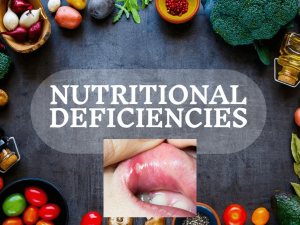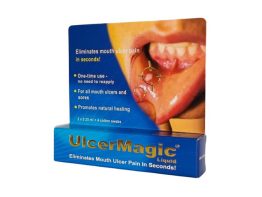Mouth ulcers, or canker sores, are small, painful lesions that form on the soft tissues inside the mouth, including the cheeks, gums, tongue, and the roof of the mouth. While many factors can contribute to their development, nutritional deficiencies are a significant but often overlooked cause. The body needs certain vitamins and minerals to maintain the health of tissues, including those in the mouth, and when you lack these nutrients, it can lead to the formation of mouth ulcers.
For those who experience recurring mouth ulcers, nutritional deficiencies may be the root cause. We explore how lacking certain nutrients can cause mouth ulcers, what nutrients are most commonly involved, and how to address these deficiencies to prevent future outbreaks.
Why Nutritional Deficiencies Cause Mouth Ulcers
The tissues inside your mouth, known as the oral mucosa, require various vitamins and minerals to stay healthy and repair themselves. When the body lacks these essential nutrients, the tissues can become weakened and more susceptible to irritation and damage. This weakness can lead to the formation of mouth ulcers, particularly when combined with other factors like stress, trauma, or illness.
Certain deficiencies can also impair the immune system’s ability to repair the tissues and fight off bacterial or viral infections, increasing the likelihood of ulcers developing. Let’s look at the nutrients critical in maintaining oral health.
Key Nutritional Deficiencies That Can Lead to Mouth Ulcers
1. Iron Deficiency
Iron is crucial for producing hemoglobin, a component of red blood cells that carries oxygen throughout the body. When you don’t get enough iron, it can lead to anemia, which in turn affects the health of tissues in the body, including the lining of the mouth.
An iron deficiency weakens the immune system and makes it harder for the body to repair damaged tissues, which can cause recurrent mouth ulcers. Other signs of iron deficiency include fatigue, pale skin, and brittle nails.
How to Address It:
- Eat iron-rich foods like red meat, poultry, lentils, spinach, and fortified cereals.
- If dietary changes are insufficient, consider taking an iron supplement, but consult with your healthcare provider before starting any supplements.
2. Vitamin B12 Deficiency
Vitamin B12 is vital for red blood cell formation and proper neurological function. A deficiency in vitamin B12 is strongly linked to mouth ulcers, as this vitamin plays an essential role in maintaining the health of the mucous membranes, including those in the mouth.
People who follow a vegetarian or vegan diet are at a higher risk of B12 deficiency since it is mostly found in animal products like meat, dairy, and eggs. Other symptoms of B12 deficiency include fatigue, weakness, and neurological changes like numbness or tingling in the hands and feet.
How to Address It:
- Increase your vitamin B12-rich foods such as beef, fish, eggs, and dairy.
- Vegans or vegetarians may need to take a vitamin B12 supplement or consume fortified foods like plant-based milk or cereals.
3. Folic Acid (Vitamin B9) Deficiency
Folic acid is another important B vitamin that helps the body produce and maintain new cells, particularly red blood cells. A deficiency in folic acid can lead to mouth ulcers by weakening the immune system and reducing the body’s ability to repair damaged tissues.
Folic acid is especially important for pregnant women, as it supports the development of the baby’s brain and spinal cord. Still, anyone can suffer from a deficiency, particularly if their diet lacks fresh fruits and vegetables.
How to Address It:
- Eat more folic acid-rich foods, such as leafy green vegetables (spinach, kale), legumes (beans, lentils), and fortified grains.
- Your healthcare provider may recommend a folic acid supplement, particularly for pregnant women.
4. Zinc Deficiency
Zinc is critical in supporting the immune system, wound healing, and cell division. Zinc deficiency can reduce the body’s ability to heal damaged tissue, leading to more frequent or severe mouth ulcers. Zinc also helps the body fight off infections that could cause or worsen ulcers.
How to Address It:
- You should include more zinc-rich foods in your diet, such as meat, shellfish, legumes, seeds, nuts, and whole grains.
- Zinc supplements are available, but you should consult your doctor before taking them, as too much zinc can have negative side effects.
5. Vitamin C Deficiency
Vitamin C is essential for producing collagen, which helps maintain the integrity of the skin and mucous membranes, including the tissues inside the mouth. A vitamin C deficiency can lead to weakened tissues, making the mouth more prone to ulcers. This is one of the causes of scurvy, a condition resulting from severe vitamin C deficiency known for causing bleeding gums and mouth sores.
How to Address It:
- Incorporate more vitamin C-rich foods like citrus fruits, strawberries, bell peppers, and broccoli into your diet.
- Vitamin C supplements can be taken if you’re not getting enough through food, but fresh fruits and vegetables are the best sources.
6. Calcium Deficiency
Though less commonly discussed, calcium deficiency can contribute to the development of mouth ulcers. Calcium is important not only for bone health but also for maintaining healthy teeth and gums. Calcium deficiency can affect the health of the oral tissues and increase susceptibility to ulcers.
How to Address It:
- Eat calcium-rich foods like dairy products (milk, cheese, yogurt), fortified plant-based milk, and leafy greens.
- If you are not getting enough calcium from your diet, consider calcium supplements, but talk to your healthcare provider before starting them.
How to Treat Mouth Ulcers Caused by Nutritional Deficiencies
If you suspect your mouth ulcers are due to a nutritional deficiency, addressing the underlying cause is key to healing ulcers and preventing future outbreaks. Here’s what you can do:
1. Improve Your Diet:
Focus on incorporating more nutrient-dense foods into your daily meals. Fresh fruits and vegetables, lean proteins, whole grains, and fortified products should comprise your diet’s core. Make sure to include a variety of foods rich in the vitamins and minerals mentioned above to support the health of your mouth’s tissues.
2. Take Supplements If Needed:
Sometimes, dietary changes alone may not be enough to correct a deficiency. If your doctor confirms a deficiency in iron, vitamin B12, folic acid, or another nutrient, they may recommend taking supplements to restore your levels. Always consult your healthcare provider before starting a new supplement to ensure it’s safe and necessary.
3. Treat the Ulcers Directly:
While addressing the deficiency is the long-term solution, there are ways to treat the ulcers themselves in the meantime:
- UlcerMagic: UlcerMagic can be applied directly to the ulcer for fast relief. It creates a protective barrier over the sore, reducing pain and irritation while promoting healing.
- Over-the-counter gels: Gels and creams designed for mouth ulcers can provide a temporary protective coating over the ulcer and help numb the pain.
- Saltwater rinses: Rinsing with salt water several times daily can help reduce inflammation and clean the ulcer.
- Avoid irritants: Avoid spicy, acidic, or salty foods that could irritate the ulcer further.
Conclusion
Mouth ulcers caused by nutritional deficiencies are not only painful but often preventable. You can reduce the risk of developing mouth ulcers by paying attention to your diet and ensuring you’re getting enough of key nutrients like iron, vitamin B12, folic acid, zinc, and vitamin C. If you already have mouth ulcers, addressing the deficiency through dietary changes or supplements and using products like UlcerMagic for relief can help promote healing and prevent future occurrences.
-
Product on sale
 UlcerMagic Mouth Ulcer and Canker Sore TreatmentOriginal price was: $ 24.95.$ 19.95Current price is: $ 19.95.
UlcerMagic Mouth Ulcer and Canker Sore TreatmentOriginal price was: $ 24.95.$ 19.95Current price is: $ 19.95.






